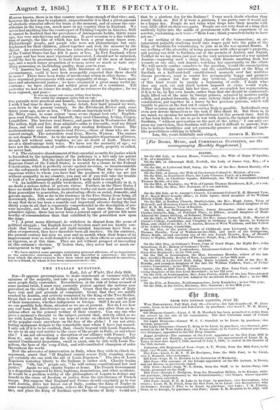THE ITALIAN QUESTION.
Ityde, Isle of Wight, 218t July 1856.
Sra—It appears presumptuous to make statements at variance with the opinions of the majority,. and take up a position the correctness of which most people flatly contradict. Nevertheless, at the risk of being accused of some mental twist, I must very earnestly protest against the notions now prevalent on the subject of Italian affairs. Grant that the people of Italy have real and just grounds of complaint. Grant that they are mildly crushed by Austria, and actively tormented by the King of the Two Sicilies. Grant that we must all wish them to hold their own once more, and be quit of their tormentors, whether indigenous or foreign. Still I do not see how we can possibly help them, situated as we are at present. Nor do I see how any realbona fide interference on our part can have any other than an in- jurious effect on the general welfare of their country. Can any one who gives a moment's thought to the subject pretend that, strictly allied as we are with Louis Napoleon, we can hope to strike an efficient blow in favour of the popular cause anywhere on the face of the globe ? I tun not attri- buting malignant designs to the remarkable man whom I have just named. I only ask if it is to be credited, that, closely leagued with Louis Napoleon, we are to do any real service to the cause of the people in Italy or anywhere else ? I am not advocating a disruption of our alliance with France. Far from it ; only let us discard the notion of successfully charging full-tilt against Continental despotismc;, small or great, side by side with Louis Na- poleon, the hero of the coup d'itat, and self-constituted champion of order throughout the world.
Now the advocates of intervention in Italy, when they wish to clinch the argument, assert that "If England cannot rescue Italy standing alone, yet certainly she can with the aid of Louis Napoleon." The idea of Louis Napoleon restoring liberty to the Italians is rather rich. Charity begins at home. "Oh, but," people say, "he will restore constitutional law and justice." Again we say, charity begins at home. The French Government is a despotism tempered by fetes, baptisms, inundations and other accidents.
It would be a problem worthy of the philosophers of inundations, to deduce any benefit to the cause of freedom or justice from the interference of French troops. But suppose that England and France should conjointly go to war with Austria, drive her forces out of Italy-, confine the King of Naples in some respectable lunatic asylum relieve the Pope of temporal responsibili- ties, and place the King of Sardinia upon the throne of Italy : would not that be a glorious day for the Italians ? I very much doubt whether they would think so. But if it were a glorious, I am pretty sure it would not be a happy day. People do not value what drops into their mouths with very little effort on their own parts. People are not very fond of a king that suddenly lights into the saddle of government with the expertness of an acrobat, exclaiming, as it were—" Here I am; think yourselves lucky to have got me." I say nothing of the commercial character of the transaction ; an ar- rangement palpably resolving itself into wages paid into the palm of the King of Sardinia for volunteering to join HS in the war against Russia. I say nothing of the absurdity of being generous with other people's property,. and paying our debt to Sardinia out of the pockets of Austria and 'Naples. Neither do we lay stress just now on the very serious nature of a war against Austria—supposing such a thing likely, with Russia smarting from her wounds on one side, and America watching her opportunity on the other. We will merely confine ourselves to the question, would the emancipation of Italy by foreign intervention, and the establishment of the King of Sardima as a half-and-half constitutional monarch over her multitu- dinous provinces, tend to render her permanently happy and prosper- ous? I cannot but fear that any artificial, compulsory settlement of this kind would be merely a beginning of strife. I doubt whe- ther any such cut and dried system imposed ab extra would work. Better that Italy should bide her time, and accomplish her regeneration, if it is to be, by her own bands, rather than that she should be condescend- ingly lifted out of the mire by foreign princes, actuated by motives partly selfish, and pushed forwards, like some rickety child in a little go-cart of a constitution, put together in a hurry by her gracious patrons, which will tumble to pieces at the first rut it conies to. That occasion may arise for succouring Italy is possible. Individuals may even now devote themselves to the task if they think fit. But there ma, to my mind, no opening for national interference at this present time. And if, as has been hinted, we are to go to war with Austria the instant she attacks Sardinia, "without provocation on the part of the latter," I can only ex- press nq conviction, that Sardinia will not find it difficult to provoke Aus- tria to initiate hostilities and 3-et externally preserve an attitude of lamb- like peacefulness edifying to behold. lam, Sir, yours faithfully and obliged, ARTHUR H. ELTON.


































 Previous page
Previous page